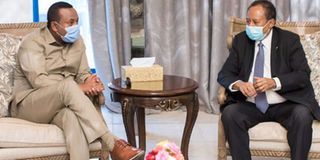Premium
Pompeo urges Sudan, Ethiopia and Egypt to continue dam talks

Sudanese Prime Minister Abdalla Hamdok (right) meeting with his Ethiopian counterpart Abiy Ahmed in Khartoum on August 25, 2020.
What you need to know:
- Dr Hamdok, and his Ethiopian counterpart, Dr Abiy, later said they would continue to work through the African Union.
The United States Secretary of State Mike Pompeo on Tuesday urged Sudan, Ethiopia and Egypt to work towards a “mutual agreement" on the filling of the Grand Renaissance Dam (Gerd), as a way to securing future stability.
In the first ever visit by the US Secretary of State in 15 years to Khartoum, Mr Pompeo prevailed upon his host, Prime Minister Abdalla Hamdok, to continue with discussions on an amicable solution on the Nile.
Mr Pompeo’s arrival in Sudan follows the thawing of relations between Israel and the United Arab Emirates and he is expected to urge Arab countries to support the new changes.
In Khartoum, the two leaders discussed “positive developments in the Sudan-Israel relationship,” the State Department said.
The visit also came on the back of reforms in Sudan as it seeks removal from the US blacklist of state sponsors of terrorism, which has made Khartoum ineligible to borrow money from international lenders for development.
PM Hamdok said there had been talks touching on sanctions, support for the transitional government and other issues.
“We had direct and transparent conversation regarding delisting Sudan as a state sponsor of terrorism, bilateral relations and US government support for the civilian government. I continue to look forward to positive tangible steps in supporting the glorious Sudanese revolution,” Dr Hamdok said.
Nile talks
Locally though, his trip also signalled discussions on the Nile mega-dam issues as Ethiopian Prime Minister Abiy Ahmed too arrived in the capital.
The US Department of State Spokesperson Morgan Ortagus said the meeting of the three leaders agreed that continued talks were the only way out of the impasse.
“The Secretary and Prime Ministers agreed that achieving mutually beneficial agreement among Sudan, Ethiopia, and Egypt on the filling and operation of the Grand Ethiopian Renaissance Dam (Gerd) is crucial to regional stability,” she said.
Dr Hamdok, and his Ethiopian counterpart, Dr Abiy, later said they would continue to work through the African Union.
The two premiers said they would authorise their respective delegations to continue with sittings.
The Gerd is Africa’s largest dam and could produce up to 6.4GW of power when complete. But downstream countries Sudan and Egypt have argued they need a permanent deal to guide its operations, and ensure that their countries do not experience water shortages.
During last negotiations, the parties haggled on legal and operational guidelines between Sudan and Egypt on the one hand, and Ethiopia on the other. They disagreed on mechanisms of dispute resolutions as well as filling of the dam.
The US had tried to mediate a deal between the three countries but failed in March after Addis Ababa accused Washington of favouring Cairo. Since then, the parties have agreed to discuss under mediators from the African Union. But a deal is yet to be reached following frequent suspension of talks.
Mr Pompeo also met with Sudanese Sovereign Council Chair General Abdel Fattah el-Burhan to discuss US support for the civilian-led transitional government and the importance of protection of civilians in Darfur, in reference to ongoing talks between the transitional government and rebel movements that control the region.





